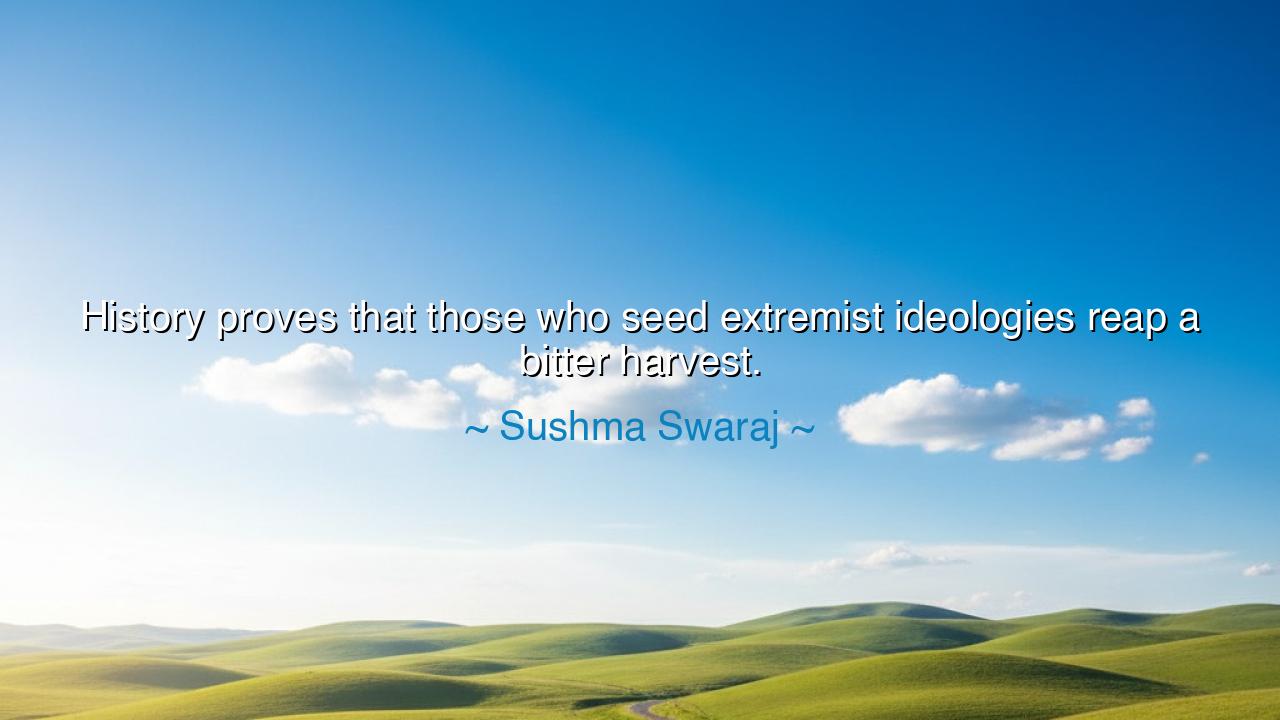
History proves that those who seed extremist ideologies reap a






In a voice as firm as justice and as clear as the dawn, Sushma Swaraj, one of India’s most eloquent stateswomen, once declared: “History proves that those who seed extremist ideologies reap a bitter harvest.” These words, though brief, ring with the resonance of centuries. They are not the warning of a politician, but the wisdom of a witness—one who has seen how hatred, once planted, grows like a weed, choking the gardens of peace and reason. In them lives the eternal law of moral cause and effect: that ideas, like seeds, bear fruit according to their nature, and that violence of thought always ripens into violence of deed.
To understand the origin of this quote, one must know the woman who spoke it. Sushma Swaraj served as India’s Minister of External Affairs and was among the most respected leaders of her generation—a diplomat of grace, intellect, and unshakable patriotism. She uttered these words in the halls of the United Nations, where the nations of the world gather to deliberate peace and justice. Her statement was not merely political; it was moral. She was addressing those who use ideology—religious, national, or political—as a weapon, those who believe that division is strength and domination a virtue. Her warning was rooted in the lessons of history: that no civilization can sow the seeds of hatred and escape its bitter harvest.
Throughout history, the pattern she spoke of has repeated like a lamenting refrain. Consider the rise of fascism in the twentieth century—how it began as a cry of pride and grievance, promising renewal but breeding ruin. Men who worshipped power above compassion turned nations into instruments of terror. The Second World War, with its oceans of blood and cities reduced to ash, was the harvest of their ideology. What began as the exaltation of one race and one will ended in the destruction of all. The world learned, at terrible cost, that extremism, no matter its banner, consumes even those who nurture it.
But Swaraj’s words reach beyond the past—they speak also to our present age. The seeds of extremist thought are still being sown, not only on battlefields, but in hearts and minds, through the voices of intolerance, prejudice, and fear. In every community, there are those who seek to divide rather than unite, to inflame rather than heal. They forget that hatred, once unleashed, cannot be contained; it returns like a tempest upon its makers. The ancient law of karma whispers the same truth that Swaraj proclaimed before the world: the energy you send forth will return to you, multiplied by the pain it causes.
The ancients knew this well. The Greek tragedians warned that hubris—the arrogance that defies moral order—inevitably brings nemesis, divine retribution. The sages of India spoke of ahimsa, the path of non-violence, teaching that peace cannot be born of enmity. Even in the scriptures of the world’s faiths, we find the same teaching in different tongues: that those who live by the sword perish by it, that hatred is a fire which burns the hand that wields it. Sushma Swaraj’s insight is thus timeless—a modern echo of an ancient truth, spoken with the authority of history and the compassion of a teacher.
Her words are not a condemnation alone—they are also an invitation to wisdom. For if we know that extremism yields bitterness, then we are called to cultivate the opposite: moderation, dialogue, empathy, and restraint. Just as a wise farmer tends his field with patience and care, so too must we tend the soil of our societies, pulling out the weeds of intolerance before they strangle the roots of unity. Swaraj’s life itself was an embodiment of this principle—she believed that diplomacy was not a contest of dominance, but a bridge of understanding. She showed that firmness and compassion can walk hand in hand, that strength need not come from anger, but from righteousness.
So let this be the lesson passed down to you, O seeker of harmony: guard your mind, for it is the first field where ideologies are sown. Question the voices that preach hatred, no matter how righteous they seem. Nurture in yourself the seeds of compassion, reason, and justice, for these will yield a harvest of peace. In your home, in your work, in your nation—wherever division takes root, be the gardener who tends toward unity. As Sushma Swaraj reminds us, the history of humankind is written in the soil of its ideas. Sow wisely, for every thought is a seed, and the future will be its fruit. The bitter harvest belongs to those who plant hatred—but the harvest of peace belongs to those who dare to plant love.






AAdministratorAdministrator
Welcome, honored guests. Please leave a comment, we will respond soon